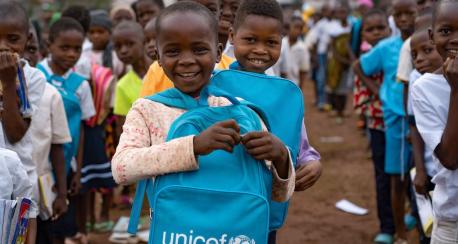
CHILDREN'S
EDUCATION
UNICEF supports every child’s right to an education no matter where they must learn — under a tent in a refugee camp, at a local school or at home using a parent’s mobile phone. Through innovation and partnership, UNICEF is reaching more children than ever with the help they need to aim for a hopeful future.
Education transforms lives and breaks the cycle of poverty
For far too many children around the world, the opportunity to learn — a fundamental right — is only a dream. Two-thirds of children in low- and middle-income countries leave primary school unable to read and understand a simple story. Only half of refugee children have attended primary school, and less than a quarter have attended secondary school.
When a child can't go to school...
- They face greater risks of lifelong poverty.
- Their health may suffer: In many parts of the world, school is where children get health care, immunizations and their one nutritious meal of the day.
- They face higher risks of abuse; if a child is living in a home where they are already experiencing neglect or dysfunctional parenting, being out of school means they are cut off from supportive teachers and friends.
The importance of educating girls
Girls are particularly at risk of missing out on their right to an education, and when they do, it's a loss for them, their family, the economy and all of society. Educating girls bolsters community stability and resilience. Girls who complete a secondary school education earn more, marry later and raise children who are healthier and better nourished. Educated girls are better protected from discrimination, exploitation and abuse, and help drive economic growth, creating more opportunities for all.
Girls from impoverished communities and girls displaced by conflict or climate-related disasters face higher risks of teen pregnancy, child labor and early marriage when access to education is disrupted and families are struggling to cope.
How UNICEF helps kids learn
UNICEF's education programs take many forms. Whether it's setting up temporary classrooms for child refugees, distributing books and other learning materials, training teachers or rebuilding an entire educational system, UNICEF works with local, national and global partners to improve children's access to quality education.
Learning Passport
UNICEF and partners continue to build on the investments made during the COVID-19 pandemic to bring education to out-of-school children through the Learning Passport, an innovative digital platform. The project is expanding beyond remote learning to create more equitable, higher-quality learning opportunities for all students.
The platform is highly flexible, and with its supporting ecosystem, it can be adapted to meet the specific needs of learners and educators in different countries and contexts. From foundational learning to skills development, the Learning Passport covers the full range of educational content and can function in formal and informal education settings, with and without internet connectivity.
Kids in Need of Desks (K.I.N.D.) Fund
In Malawi, more than 50 percent of students must learn sitting on the ground or floor because they go to a school without chairs and desks. In 2010, UNICEF USA and MSNBC's Lawrence O'Donnell set out to change that with Kids in Need of Desks (K.I.N.D.), a campaign to provide Malawi's students with the comfort and dignity they need to do their best work. Since then, over 1.1 million kids in the country have benefited from the initiative, which also provides scholarships to Malawian girls to give them the foundation they need to go on to higher education.
Let Us Learn — Education Equity
Access to quality education is every child's right, regardless of their gender, background, location, income or circumstance. Yet, today far too many things stand in the way of children exercising that right: conflict, natural disasters, health crises, poverty, geographic isolation, social exclusion. The UNICEF Let Us Learn program, which launched in 2011 in Afghanistan, Bangladesh, Liberia, Madagascar and Nepal, seeks to level the playing field and remove the obstacles to out-of-school children's learning.
Through Let Us Learn, UNICEF and partners provide out-of-school children with alternative ways to learn while also helping to strengthen formal education systems for fully enrolled students, paying particular attention to girls and children with disabilities. The initiative supports children into young adulthood through early childhood education, primary and secondary school, as well as vocational training.
Advocate for children: Urge Congress to support the READ Reauthorization Act.



